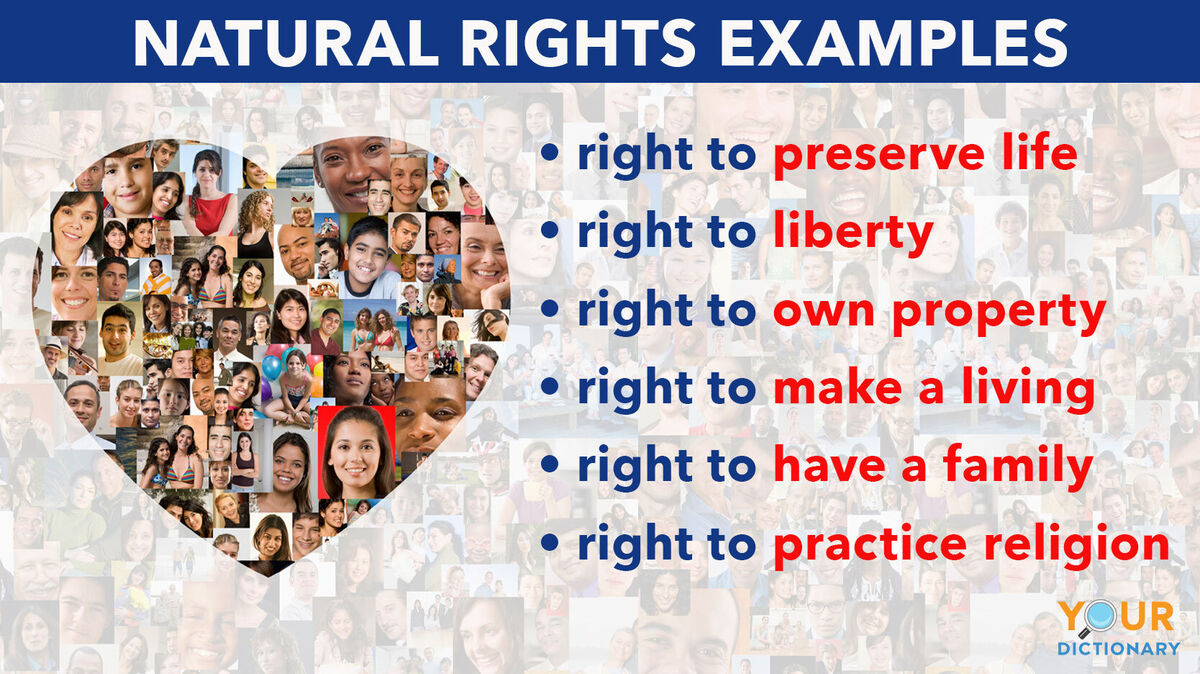
What is the difference between natural rights and human rights? Can you go to jail for denying someone's natural rights? Learn more about the concept of natural law and the rights guaranteed within it with these key examples of natural rights.
What Is the Definition of Natural Rights?
Natural rights refer to the rights given to all humans, simply for the sake of being human. They are universal moral principles among all cultures and societies and can't be reversed by government laws. For this reason, natural rights are often called inalienable rights — rights that cannot be taken away. Natural rights are the basis of a social contract in society. They would exist even if the government didn't exist.
Ancient Greek philosopher Cicero first wrote of natural rights as a part of natural law. In the 13th century, Thomas Aquinas' natural rights definition stated that the main principle of natural law was that "good is to be done and pursued and evil avoided." During the Age of Enlightenment, philosophers Thomas Hobbes, John Locke and Thomas Paine used the concept of natural laws to challenge the divine right of kings. Modern interpretations of natural rights include the United States Declaration of Independence and the United Nations Universal Declaration of Human Rights.
Examples of Natural Rights
What are natural rights examples in your daily life? John Locke believed that the most basic and essential natural right is the preservation of mankind — that is, the right to life. He also wrote of "liberty and estate (property)." Thomas Jefferson famously summed up Locke's views in the preamble of the Declaration of Independence. Take a look at some natural rights examples and what they really mean.
The Right to Preserve Life
All humans have the right to stay alive, and no government can ever take that right away. This right extends to the right to defend yourself against people who cause you harm. Most philosophers agree that the right to life is the most fundamental natural right.
The Right to Liberty
Humans have the right to a free life. They have freedom of movement (which is freedom from unlawful detainment) and freedom of thought. Some believe that the right to privacy falls into the natural right of personal liberty.
The Right to Own Property
Every person has the right to own property, either by themselves or with other people. In the 17th and 18th centuries, one's ability to own property reflected their ability to participate in society. Some philosophers, including John Locke, believed that one's ability to own property extended to their ownership of their own labor.
The Right to Make a Living
Humans have the right to earn money in order to make a living. Thomas Jefferson summarized this right as "the pursuit of happiness." This right reflects one's right to economic liberty; the government cannot stop a person from making a living.
The Right to Have a Family
All people have the right to marry and to have a family. Aquinas wrote extensively of this view, which maintains that one has a natural right to marry as a reflection of their natural liberty. They may also have children without the consent of the government or state.
The Right to Practice Religion
Everyone has the right to form and practice a relationship with the religion of their choice. The right to religion is reflected in both Aquinas' writing and in the United States Bill of Rights. Aquinas wrote of the right to know God, while the Bill of Rights clarifies that Americans have freedom of religion without government intervention.
What Aren't Natural Rights?
The above rights are generally accepted among philosophers as natural rights. But what's the difference between natural rights and civil rights, or natural rights and human rights? Check out the minor differences between these terms — and the major differences they play in our lives.
Natural Rights vs. Civil Rights
Civil rights are rights given to individuals by societies. They are established and enforced by law. Natural rights exist even if a society falls apart, but civil rights would disappear without someone to enforce them. Civil rights protect individuals from discrimination based on their race, sex, age, disability, sexual orientation, religion, or any other protected class. Civil liberties, like those outlined in the Bill of Rights (such as Freedom of the Press and Freedom of Speech), apply legal protection to natural rights to freedom, but again, they would cease to exist without a government to enforce them.
Natural Rights vs. Human Rights
Many people use natural rights and human rights interchangeably. However, they are slightly different. Natural rights exist whether a government acknowledges them or not. Human rights are a government's acknowledgment of the rights their citizens should have by virtue of being human. They may overlap — for example, the right to live is both a natural right and a human right — but natural rights always exist and do not change over time. A government may apply, change or strip the legal human rights from their citizens when they desire. They may never change one's natural rights.
Using Your Natural Rights
No king, president, congressional body, or ruling power can take your natural rights away. Most modern democracies have provisions in their constitutions to protect these rights, just like the United States Constitution. Learn more about how natural rights become civil liberties with these examples of civil disobedience in history.